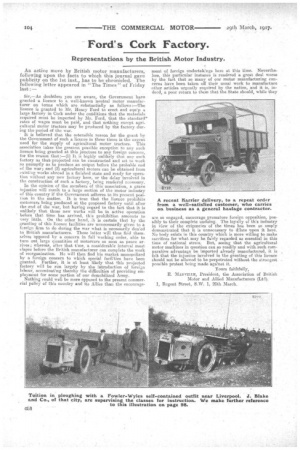Ford s Cork Factory.
Page 22

If you've noticed an error in this article please click here to report it so we can fix it.
Representations by the British Motor Industry.
An active move by British motor manufacturers, following upon the facts to which this journal gave publicity on the 1st inst., has to bc chronicled. The following letter appeared in "The Times" of Friday last:
Sir,--As doubtless you are aware, the Government have granted a licence to a well-known neutral motor manufacturer on terms which are substantially as follows:—The licence is granted to Mr. Henry Ford to erect and equip a large factory in Cork under the conditions that the materials required must be imported by Mr. Ford, that the standard' rates of wages must be paid, and that seething except agricultural motor tractors may he produced by the factory during the period of the war.
• it is believed that the ostensible reason for the grant by the Government of such a licence in these times is the urgent need for the supply of agricultural motor tractors. This association takes the greatest possible exception to any such licence being granted at this juncture to any foreign concern, for the reason that:—(l) It is highly unlikely that any such factory as that-projected can be constructed and set to work eo promptly as to produce an output before the probable end of the war; and (2) agricultural motors can be obtained from existing works abroad in a finished state and ready for operation without any new factory here, or the delay involved in the construction of such a factory, being rendered necessary. In the opinion of the members of this association, a grave injustice will result to a large section of the motor industry of this country if the Government adheres toite present position in the matter. It is true that the licence prohibits motorcars being produced at the proposed factory until after the end of the war, but havine, regard to the fact that it is unlikely that these new works will be in active operation before that time has arrived, this prohibition amounts to very little. On the other hand, it is certain that by the granting of this licence facilities are unnecessarily given to a foreign firm to do during the war what is necessarily den'ed to British manufacturers. These latter will thus find themselves 'opposed by a concern in full 'working Order, able to turn out large quantities of motorcars so soon as peace arrives; whereas, after that time, a considerable interval must elapse before the British manufacturer can complete the work of reorganization. He will then find his market monopolized by a foreign concern to which special facilities have been granted. Further, it is at least likely that this projected factory will be run largely by the introduction of foreign labour, accentuating thereby the difficulties of providing employment for scene portion of our demobilized Army. Nothing could well be snore opposed to the present commercial policy of this country and its Allies than the encourage ment of foreign undertakings here at this time. Nevertheless, this particular instance is rendered a great deal worse by the fact that so many of our motor manufacturing concerns have beezi taken off their usual work to manufacture other articles urgently required by the nation, and it is, indeed, a poor return to them that the State should, while they are so eugaged, encourage premature foreign opposition, possibly to their complete undoing. The loyalty of this industry in view of the exigencies of the times has been so amply demonstrated that it is unnecessary to dilate upon it here. No body exists in this country which is more willing to. make sacrifices for what may be fairly regarded, as essential in this time of national stress. But, seeing that the agricultural motor machines in question can so readily and with such comparative advantage be imported already manufactured, it is felt that the injustice involved in the granting of this licence should not be allowed to be perpetrated without the strongest possible protest being made against it.
Yours faithfully,
E. .11Luvviricm, President, the Association of British Motor and Allied Manufacturers (Ltd). 1, Regent Street, S.W. 1, 20th March.
























